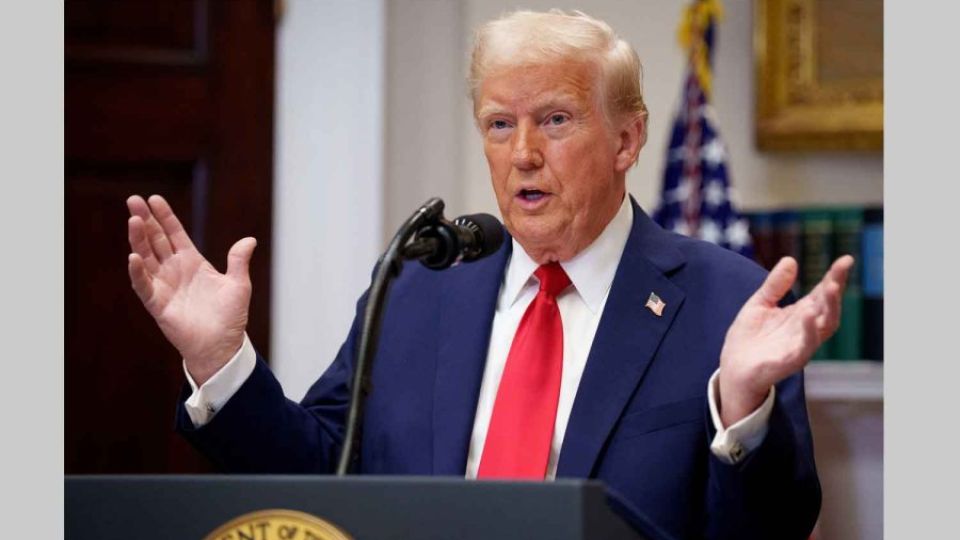January 22, 2025
SEOUL – US President Donald Trump on Monday labeled North Korean leader Kim Jong-un as a “nuclear power,” while boasting of their friendship immediately after his inauguration.
In response to a question about threats to country, Trump answered, “I think we have a lot of them right now. Right now I think we have a lot. I think North Korea turned out to be good. I was very friendly with him (Kim). He liked me. I liked him. We got along very well.”
“They thought that was a tremendous threat. Now he is a nuclear power. But we got along,” Trump told media during press availability while returning to the Oval Office to sign documents after being sworn in as president at the Capitol Rotunda in Washington.
Trump also praised what appeared to be a reference to North Korea’s Kalma-Wonsan coastal tourism zone, which North Korean state media reported on Dec. 31 last year is scheduled to open in June, marking the completion of a decadelong construction effort.
“I think he has tremendous condo capabilities. He’s got a lot of shoreline.”
Trump’s use of the term “nuclear power,” which some interpret as implicitly acknowledging North Korea as a nuclear weapons state, has drawn significant attention in Seoul. This comes particularly in light of Pete Hegseth, Trump’s nominee for secretary of defense, also referring to North Korea as a nuclear power during a written statement for last week’s confirmation hearing.
At that time, Seoul’s Defense, Foreign and Unification ministries promptly rejected Hegseth’s statement when asked for comment, each asserting in their respective statements that North Korea can never be recognized as a nuclear power, despite its possession of nuclear weapons.
But this time, multiple diplomatic sources who spoke to The Korea Herald on condition of anonymity underscored the need not to over-interpret Trump’s use of the term “nuclear power. ”
The Foreign Ministry also said Trump’s comments echo his stance on resolving North Korean issues through engagement.
“President Trump’s remarks today align with the context of the first-term Trump administration and his statements during the presidential campaign, which emphasized addressing the North Korean nuclear issue through engagement, including summit diplomacy,” a Foreign Ministry official said on condition of anonymity.
“It is also noteworthy that, in responding to a reporter’s question, President Trump emphasized other threats, including the North Korean issue.”
The Foreign Ministry official, however, reiterated the government’s position that “Under the Nuclear Non-Proliferation Treaty (NPT), North Korea can never achieve the status of a nuclear-weapon state.”
“The denuclearization of North Korea is a principle consistently upheld by South Korea, the United States, and the international community,” the official added.
“North Korea is illegally developing nuclear weapons in violation of the NPT and relevant UN Security Council resolutions. Accordingly, our government will closely cooperate with the new US administration to achieve North Korea’s denuclearization while continuing to work in coordination with the international community.”
The term nuclear power differs from the formal designation “nuclear-weapon state.” Under the Treaty on the Non-Proliferation of Nuclear Weapons, “nuclear-weapon state” specifically refers to the five recognized nuclear-armed countries: the US, the UK, France, China and Russia. All other nations are officially categorized as non-nuclear-weapon states.
However, nuclear power has often been used interchangeably by some to imply recognition of North Korea as a nuclear-weapon state — a notion the international community firmly rejects.
Rep. Kwon Young-se, interim leader of the People Power Party and former Unification Minister, said “From the party’s perspective, it’s certainly very regrettable,” leaving room for further interpretation during a press briefing following his meeting with Joseph Yun, Charge d’Affaires ad interim at the US Embassy in Seoul.
“But whether that reflects the official government stance or was just a casual remark remains unclear,” Kwon said. “With the Trump administration only launching today, it’s too early to determine whether this signals a shift in policy. It might not necessarily mean that.”
Rep. Kim Gunn of the ruling People Power Party, a former chief nuclear envoy, said nuclear power “doesn’t directly imply official recognition of North Korea as a nuclear-weapon state” in an interview with YTN radio on Tuesday.
“The US Department of Defense, given the reality of North Korea possessing nuclear weapons, must formulate its defense policy accordingly. In this context, it uses the term nuclear power to describe the situation,” Kim said. “This term reflects the need to develop military capabilities and deterrence to respond to such a threat.”
Seoul’s sensitive response to the emergence of nuclear power terminology comes as it braces for the possibility of Trump pursuing a “small deal” with Kim — potentially accepting North Korea’s nuclear armament in exchange for concessions, rather than demanding complete denuclearization.
During his election campaign, Trump repeatedly claimed that his friendship with North Korea’s leader caused no harm and even made the world safer.
Trump is the only US president to meet a North Korean leader, holding three summits with Kim: a 2018 summit in Singapore, another summit in 2019 in Hanoi, Vietnam, which ended abruptly, and a brief June 2019 meeting at the Demilitarized Zone, where Trump became the first sitting US president to enter North Korea.


